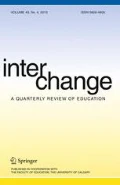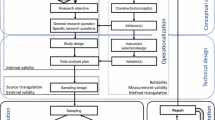Abstract
Adult education is one of the platforms of skills development for the mostly disadvantaged people of South Africa who did not get formal education owing to past segregation and apartheid laws. Recently this sector has implemented inclusive education and is in the process of transforming and changing to achieve inclusion. This interpretative-qualitative case study within participatory action research explored the role of participatory action research as a change strategy to develop inclusive teaching practices and enhance adult student learning in an adult education context. Data were collected through semi-structured interviews, participant observations, documentary analysis, focus group interviews and group interpretative meetings in all four phases, i.e. planning, observation, action and reflection. After the group data analysis with co-researchers during group interpretative meetings and the researcher’s analysis using an interpretative-thematic inductive qualitative data analysis framework, the study found that participatory action research is viable as an educational change strategy, as it enhances collaboration among adult education teachers and improves their ability to be reflective and critical in their practice, which is fundamental in the development of inclusive teaching practices.

Source: Makoelle (2013, p. 95)
Similar content being viewed by others
References
Ainscow, M., Booth, T., & Dyson, A. (2006). Improving schools, developing inclusion. Routledge.
Ampartzaki, M., Kypriotaki, M., Voreadou, C., Dardioti, A., & Stathi, I. (2013). Communities of practice and participatory action research: The formation of a synergy for the development of museum programmes for early childhood. Educational Action Research, 21(1), 4–27. https://doi.org/10.1080/09650792.2013.761920
Bada, D., & Olusegun, S. (2015). Constructivism learning theory: A paradigm of teaching and learning. IOSR Journal of Research & Method in Education, 5(6), 66–70.
Baeten, M., Knyndt, E., Stryven, K., & Dochy, F. (2010). Using student centered learning environment to stimulate deep approaches to learning. Educational Research Review, 5(3), 243–260. https://doi.org/10.1016/j.edurev.2010.06.001
Baldwin, M. (1997). Participatory action research. In M. Gray, J. Midgley & S. A. Webb, SAGE handbook of social work, pp 467–481. Retrieved from https://www.academia.edu/3991129/Participatory_Action_Research
Bird, G., Alton, S. & Mackinnon, C. (2004). Accessing curriculum—strategies for differentiation for pupils with Down syndrome. Cumbria: the down syndrome educational enterprises CIC. Retrieved from http:/www.downsyndrome.net.
Bradbury, H., & Reason, P. (2003). Action research: An opportunity for revitalizing research purpose and practices. Qualitative Social Work, 2(2), 155–175. https://doi.org/10.1177/1473325003002002003
Dalton, E. M., Mckenzie, J. E., & Kahonde, C. (2012). The implementation of inclusive education in South Africa: Reflections arising from a workshop for teachers and therapists to introduce universal design for learning. African Journal of Disability, 1(1), 13.
Denzin, N. K., & Lincoln, Y. S. (1994). Handbook of qualitative research. Sage.
Dettmer, P., Thurston, L. P., Knackendoffel, A., & Dyck, N. (Eds.). (2009). Collaboration, consultation, and teamwork for students with special needs. Upper Saddle River: Pearson.
Department of Education. (1995). White paper 1. Education and training in a democratic South Africa: First steps to develop a new system. Pretoria: Government Printers.
Department of Education. (2001). Education white paper 6. Special needs education: Building an inclusive education and training system. Pretoria: Government Printer.
Department of Basic Education. (2010). Guidelines for inclusive teaching and learning. Pretoria: Government Printers.
Department of Education. (1997). Policy document on adult basic education and training. Pretoria: Government Printers.
DuFour, R. (2009). Professional learning communities: The key to improve teaching and learning. Retrieved from https://www.advanc-ed.org/source/professional-learning-communities-key-improved-teaching-and-learning
Du Toit, L. (2004). Education for all. Pretoria: University of South Africa
Engelbrecht, P., Nel, M., Nel, N., & Tlale, D. (2015). Enacting understanding of inclusion in complex contexts: Classroom practices of South African teachers. South African Journal of Education, 35(3), 1–10.
Eyibe, S. C. (2005). Curriculum fundamentals of adult education. Onitsha: Inn son.
Fullan, M. (2016) Change theory: A force for school improvement. Centre for Strategic Education Seminar Series, Paper no 157. Retrieved from: http://michaelfullan.ca/wp-content/uploads/2016/06/13396072630.pdf
Garth, H. (2004). Participatory action research. Houston, TX: Rice University. Retrieved from http://www.socialwellbeing.org/works/HistRepGarth2.pdf
Gultig, J., Hoadley, U., & Jansen, J. (Eds.). (2002). Curriculum: From plans to practices. Oxford University Press.
Hargreaves, A., & Goodson, I. (2006). Educational change over time? The sustainability and nonsustainability of three decades of secondary school change and continuity. Educational Administration Quarterly, 42(1), 3–41.
Houle, C. (1996). The design of education (2nd ed.). Jossey-Bass.
Kitzinger, J. (2005). Focus group research: Using group dynamics to explore perceptions, experiences and understandings. In I. Holloway (Ed.), Qualitative research in health care (pp. 56–61). Maidenhead: Open University Press.
Knowles, M. S. (1980). The modern practice of adult education: Andragogy versus pedagogy. Englewood Cliffs, NJ: Cambridge Adult Education.
Knowles, M. S. (1984). Introduction: The art and science of helping adults learn. Andragogy in action: Applying modern principles to adult learning. San Francisco, CA: Jossey-Bass.
Knowles, M. S. (1990). The adult learner: A neglected species (4th ed.). Gulf.
Knowles, M. S. (1998). The adult learner: The definitive classic in adult education and human resource development. Houston, TX: Gulf.
Knowles, M. S. (2001). Understanding the adult learner. In B. Woolls & B. E. Sheldon (Eds.), Delivering lifelong continuing education across space and time (pp. 242–247). IFLA Publications.
Makoelle, T. M. (2012). Analysing the use of action research to develop practices of inclusion: A case of South African school. Journal of Sociology and Social Anthropology, 3(2), 83–91.
Makoelle, T. M. (2013). Exploring teaching practices that are effective in promoting inclusion in South African secondary schools. Doctoral Thesis. Manchester, University of Manchester.
Makoelle, T. M. (2014). Pedagogy of inclusion: A quest for teaching and learning. Mediterranean Journal of Social Sciences, 5(17), 1257–1269.
Makoelle, T. M. (2017). Assessment in inclusive classrooms: Analysis of elected Kazakhstani classrooms in inclusive schools. Pedagogical Dialoque, 1(19), 62–65.
Miller, S. P. (2009). Validated practices for teaching students with diverse needs and abilities (2nd ed.). Pearson.
Mortier, K., Hunt, P., Leroy, M., Van de Putte, I., & Van Hove, G. (2010). Communities of practice in inclusive education. Educational Studies, 36(3), 345–355. https://doi.org/10.1080/03055690903424816
Niemi, R., Heikkinen, H. L. T., & Kannas, L. (2010). Polyphony in the classroom: Reporting narrative action research reflexively. Educational Action Research, 18(2), 137–149.
Nind, M. (2014). Inclusive research and inclusive education: Why connecting them makes sense for teachers and learners democratic development of education. Cambridge Journal of Education, 44(4), 525–540. https://doi.org/10.1080/0305764X.2014.936825
Opertti, R., & Ji, L. (2017). Inclusive student assessment. UNESCO.
Prater, M. A. (2007). Teaching strategies for students with mild to moderate disabilities. Allyn and Bacon.
Patton, M. Q. (1990). Qualitative evaluation and research methods. Sage.
Smith, T. E. C., Pollway, E. A., Patton, J. R., & Dowdy, C. A. (2008). Teaching students with special needs in inclusive settings (5th ed.). Allyn and Bacon.
Spratt, J., & Florian, L. (2015). Inclusive pedagogy: From learning to action. Supporting each individual in the context of everybody. Teaching and Teacher Education, 49, 89–96.
Swart, E., & Pittipher, R. (2006). A framework for understanding inclusion. In E. Landsberg & E. Swart (Eds.), Addressing barriers to learning: A South African perspective. Van Schaik: Pretoria.
Terre Blanche, M. T., Durrheim, K., & Painter, D. (2006). Research in practice: Applied methods for social sciences (2nd ed.). University of Cape Town Press.
UNESCO. (2001). Understanding and responding to children’s needs in inclusive classrooms. UNESCO.
Verner, C. (1962). Adult education theory and method: A conceptual scheme for the identification and classification of processes. Adult Education Association of the USA.
Walton, E., Carrington, S., Saggers, B., Edwards, C., & Kimani, W. (2019). What matters in learning communities for inclusive education: A cross-case analysis. Professional Development in Education. https://doi.org/10.1080/19415257.2019.1689525
Windschitl, M. (1999). The challenges of sustaining a constructivist classroom culture. Phi Delta Kappan, 80(10), 751–755.
Author information
Authors and Affiliations
Corresponding author
Additional information
Publisher's Note
Springer Nature remains neutral with regard to jurisdictional claims in published maps and institutional affiliations.
Rights and permissions
About this article
Cite this article
Ngwenya, N., Makoelle, T.M. & van der Merwe, M. Participatory Action Research as Change Strategy: A Case of Developing Inclusive Teaching and Learning Practices in an Adult Education Centre in Gauteng East District of South Africa. Interchange 52, 393–414 (2021). https://doi.org/10.1007/s10780-021-09435-3
Received:
Accepted:
Published:
Issue Date:
DOI: https://doi.org/10.1007/s10780-021-09435-3




